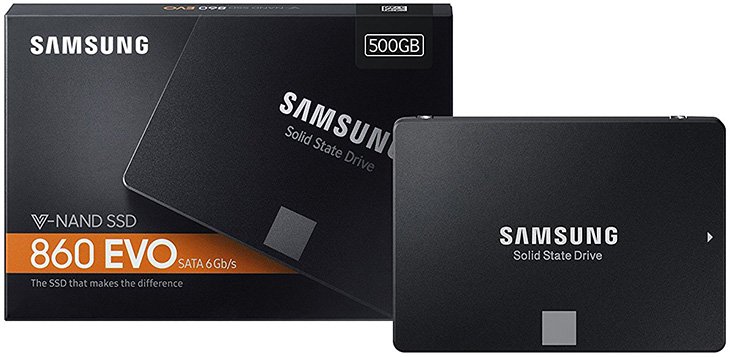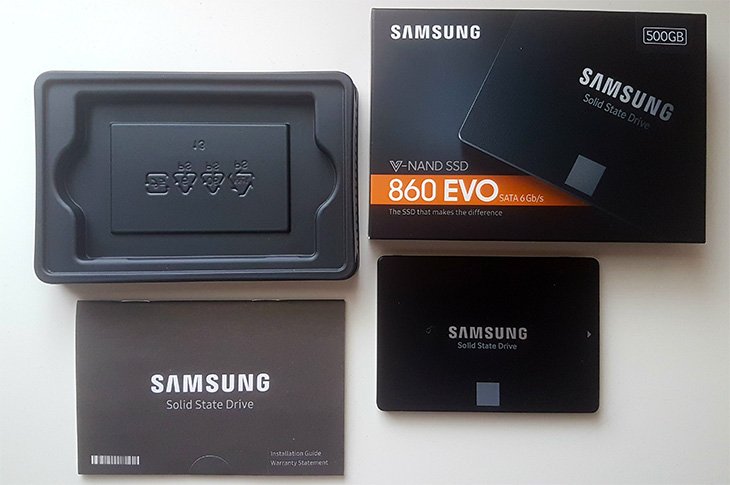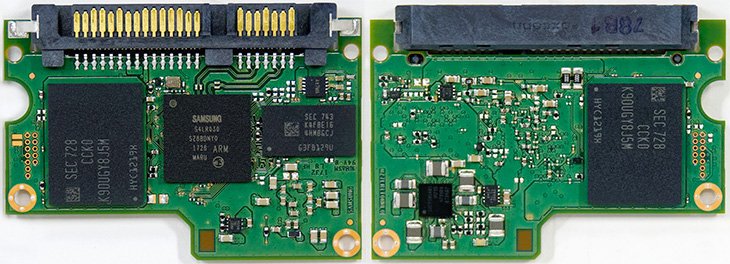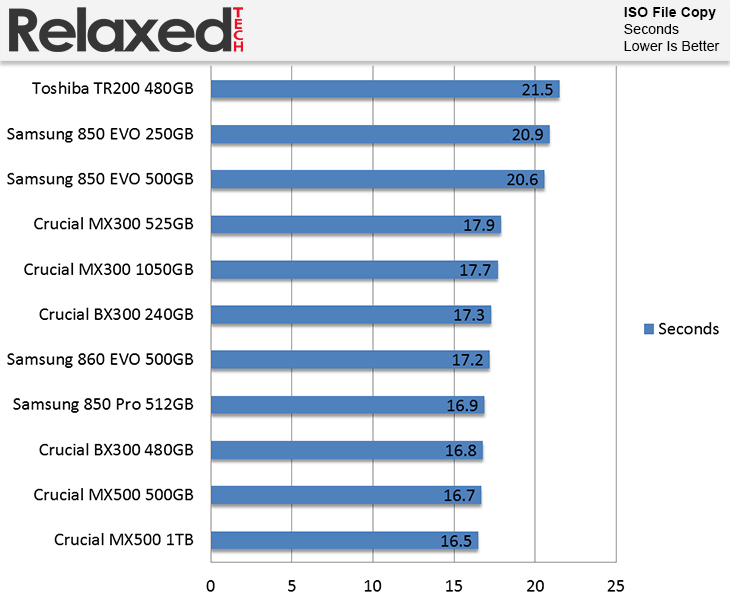
Samsung 860 Evo SSD Review: A Worthy Successor To The 850 Evo
Introduction

Samsung recently expanded their popular mainstream SSD line with the addition of the 860 Evo and 860 Pro SSDs which are the successor to the 850 Evo and 850 Pro series that were released more than three years ago. Samsung's newest 860 SATA SSDs are specially designed for mainstream desktops and laptops and offer improvements in speed, reliability, compatibility and capacity compared to the previous generation. A big difference between the 860 Pro and 860 Evo is the NAND. The 860 Pro uses 2bit MLC 3D-NAND, while the 860 Evo uses 3bit MLC which is also known as TLC flash.
In this review, we will focus on the 860 Evo 500GB model that retails for $170 on Amazon. The 860 Evo series feature a 5-year limited warranty and retail for $94.99, $169.99, $329.99, $649.99, and $1,399.99 for the 250GB, 500GB, 1TB, 2TB, and 4TB, respectively. Samsung is shipping their 860 Evo series in three form factors: 2.5”, M.2 and mSATA. The M.2 line tops out at 2TB while mSATA stops at 1TB.
The 860 series come with significantly higher write endurance compared to the 850 series and also feature the new updated MJX controller which offers a nice performance bump across the board. All form factors use the AHCI interface which means their transfer speeds are limited by the bandwidth of the SATA 6 Gbps standard. The 860 Evo comes with plenty of attractive features such as hardware encryption and enhanced Intelligent TurboWrite technology which accelerates sequential read and write speeds.

The 860 Evo comes equipped with Samsung's new 64-layer 3D TLC NAND and utilizes the new MJX controller backed by Samsung's own low-power LPDDR4 memory. Samsung advertises the 860 Evo series with sequential read speeds of up to 550 MB/s and sequential write speeds of up to 520 MB/s for all capacities. Random 4K (QD32) write speeds for all capacities is rated for up to 90K IOPS and 98K IOPS for random 4K (QD32) read speeds.
Pricing & Endurance
Samsung's 3D-NAND technology is built to endure 150TB (TBW) for the 250GB model which equals to about 82GB per day for 5 years. The 500GB and 1TB models can handle up to 300TB and 600TB (TBW) and this equates to 164GB daily read/write for the 500GB model and 328GB for the 1TB model for 5 years. The 2TB and 4TB models on the other hand can endure up to 1,200TB (TBW) and 2,400TB (TBW) which equals to about 657GB per day for the 2TB model and 1.3TB per day for the 4TB model for 5 years.
The main competitor of the Samsung 860 Evo is the Crucial MX500 and in this review we will benchmark them to see which one offers the best performance. I want to mention that Crucial has increased their warranty from 3 years to 5 years for their MX500 SSDs to compete with the Samsung 860 Evo. Price-wise, the 860 Evo SSDs are significantly more expensive than the Crucial MX500 drives. For example, the 860 Evo 1TB retails for $330 while the MX500 1TB sells for $260 which makes the MX500 1TB about $70 cheaper. The other MX500 models are just as cheaper but capacity-wise, the MX500 series max out at 2TB while Samsung offers users up to 4TB which is very impressive.
Crucial does have the upper hand in price but that's about it. Samsung's 860 Evo SSDs offer much higher write endurance than the competition. Crucial's MX500 1TB drive can only endure 360TB (TBW) while the 860 Evo 1TB almost doubles that with up to 600TB TBW. The MX500 500GB comes with 180TB (TBW) which is almost half of the 860 Evo 500GB that supports up to 300TB (TBW). The difference in write endurance increases even more if we compare the 2TB model. So we are looking at up to 1,200TB (TBW) for the 860 Evo 2TB compared to 700TB (TBW) for the MX500 2TB.
Features
The 860 Evo supports many advance features such as Self Monitoring and Reporting Technology (SMART) which is basically a monitoring system used to perform an analysis of the drive for problems with the intent of anticipating hardware failures. It also comes with support for error correction codes (ECC) which are used in NAND Flash memories to detect and correct bit-errors. The 860 Evo supports TRIM which basically means the operating system can inform the SSD which blocks of data are no longer in use and can be wiped internally.
The 860 Evo has up to six times longer sustained performance than its predecessor due to enhanced Intelligent TurboWrite. The TurboWrite buffer size varies based on the capacity of the SSD; 12GB for 250GB model, 22GB for 500GB model, 42GB for 1TB model and 78GB for 2/4TB. With the TurboWrite technology, a part of the 3D V-NAND memory (3 bits per cell) acts as SLC memory (one bit per cell) and this portion of the NAND memory in the disk acts as a specific buffer through which all data write operations pass.
Samsung's MJX controller comes with support for Opal/TCG V2.0 encryption which you can use to keep your personal files and confidential data restricted from hackers and thieves with AES 256-bit hardware-based encryption. Being hardware-based means that the encryption engine secures your data without the performance degradation that you may experience with software-based encryption.
These are all the advanced features the Samsung 860 Evo supports:
- Error Correction Code (ECC)
- Garbage Collection
- TRIM Support
- Self-Monitoring and Reporting Technology (SMART)
- AES 256-bit Full Disk Encryption
- TCG/Opal V2.0
- TurboWrite Technology
- Encrypted Drive (IEEE1667)
Specifications
| Samsung 860 Evo Series Lineup | |||||
|---|---|---|---|---|---|
| Model | 250GB | 500GB | 1TB | 2TB | 4TB |
| Price | $94.99 | $169.99 | $329.99 | $649.99 | $1399.99 |
| Interface | SATA III 6Gb/s | ||||
| Protocol | AHCI | ||||
| Form Factor | 2.5" | ||||
| Dimensions | 100x 69.85x 6.8 (mm) | ||||
| Controller | Samsung MJX Controller | ||||
| DRAM (LPDDR4) | 512MB | 1GB | 2GB | 4GB | |
| NAND | Samsung 64-layer V-NAND 3bit TLC | ||||
| Sequential Read | 550 MB/s | ||||
| Sequential Write | 520 MB/s | ||||
| 4KB Random Read (QD1) | 10,000 IOPS | ||||
| 4KB Random Write (QD1) | 42,000 IOPS | ||||
| 4KB Random Read (QD32) | 98,000 IOPS | ||||
| 4KB Random Write (QD32) | 90,000 IOPS | ||||
| Endurance (TBW) | 150 TB | 300 TB | 600 TB | 1,200 TB | 2,400 TB |
| Operating Temperature | 0°C to 70°C | ||||
| Life Expectancy | 1.5 Million Hours | ||||
| Device Sleep Typical | 2 mW | 2.6 mW | 5 mW | 8 mW | |
| Idle (DIPM on) | 50 mW | ||||
| Active (Read/Write) | 2.2 mW | 2.5 mW | 3 mW | ||
| Humidity | 5% to 95% non-condensing | ||||
| Usage Application | Client PCs | ||||
| TRIM supported | Yes | ||||
| Encryption | Yes | ||||
| Firmware | RVT01B6Q | ||||
| Warranty | 5 Years | ||||
| Launch Date | January 2018 | ||||
Packaging

Samsung has changed the packaging this time which I have to admit looks really nice. You will notice the orange strip on the front that signifies the Evo range and also the SATA interface and the capacity which is located on the top right corner. On the back you will find a large sticker displaying similar information such as model, serial number, capacity and warranty information. The 860 Evo comes in a black aluminum enclosure and has a light gray square under the Samsung branding. Like most SSDs, the 860 Evo utilizes the SATA III 6Gbps interface but it is compatible with SATA II and SATA I interfaces, but that means it will work at a reduced speed.
You can download the Samsung Magician software that helps enhance the performance of your SSD by allowing you to update the firmware, over-provision, secure-erase, and track the health of the SSD as well as see how much storage you’ve used. When you are inside the Samsung Magician software, make sure to head over to the OS Optimization screen to configure your OS to work best with the SSD and you can manually toggle options on/off. By default, index searching, prefetch, superfetch are enabled so you can disable them because they are not needed if you are using an SSD and I would also set the power options to high performance.

Above you will see a picture of the internals of the 860 Evo 500GB model. There are a total of two NAND flash memories, with one on each side of the PCB which are produced by Samsung and are built on a 10nm 3D NAND process. On one of the sides, you will find the Samsung MJX controller and a DRAM chip next to it which basically provides the SSD controller with RAM. The 250GB/500GB models get 512MB DRAM cache buffer while the bigger 1TB, 2TB and 4TB models come with 1GB, 2GB and 4GB DRAM cache buffer, respectively.
Test Methodology
| Test Setup | |
|---|---|
| Processor: | AMD Ryzen 7 1700X (3.8Ghz) |
| Motherboard: | MSI X370 xPower Titanium (BIOS v1.9) |
| RAM: | Ballistix Elite 16GB (2x8GB) DDR4 3200 MHz |
| Graphics Card: | Nvidia GeForce GTX 1070 |
| Storage: | Samsung 860 Evo 500GB Crucial MX500 1TB Crucial MX500 500GB Crucial BX300 240GB Crucial BX300 480GB Crucial MX300 525GB Crucial MX300 1TB Toshiba TR200 480GB Samsung 850 EVO 500GB Samsung 850 EVO 250GB Samsung 850 Pro 512GB |
| Power Supply: | Seasonic Focus Plus 750W Gold |
| Heatsink: | Noctua NH-D15 |
| OS: | Windows 10 Pro 64-Bit |
| Thermal Compound: | Noctua NT-H1 |
| Case: | Corsair 400C |
To make sure these drives perform at their maximum performance, we will be disabling all the power saving features in the BIOS (C6-state, etc). The testing was done on a fresh install of Windows 10 64-bit with the latest windows updates installed. We disabled a bunch of unnecessary services such as drive indexing, Prefetch, Superfetch, Defrag and removed all the bloatware from Windows 10 to make sure there were as few processes running as possible during the testing.
We'll be using the AMD Ryzen 7 1700X processor overclocked to 3.8Ghz and the MSI X370 xPower Titanium motherboard
with the latest BIOS version which at the time of writing this is v1.90.
Installing and using an SSD is pretty straight forward, simply connect one end of your SATA cable to the SATA port in your motherboard and the other end of the cable to your SSD.
After installing windows, make sure to check if you have the latest firmware.
Benchmark Software:
+ Windows 10 Startup
+ Adobe PS CS6 Startup
+ AS SSD
+ IOMeter
+ HD Tune Pro
+ ISO File Copy
Benchmark Results

Windows 10 boot times are measured from the time it takes between hitting the power button to reaching the Windows desktop.

Startup times for Adobe Photoshop CS6 are measured from the moment it takes to open up the application.

The AS-SSD software is a popular benchmarking software used to measure the performance of an SSD. In this test we are measuring the overall score.

Once again, we are using the AS-SSD software to measure sequential read and write speed of each drive.

In this test, we are using IOMeter which is one of the best application for stress testing the random IO performance of an SSD. IOMeter is set to use 4KB file size chunks and will stress the SSD with random 4 KB files.

Here we are using HD Tune Pro to measure read and write IOPS. HD Tune Pro is a Hard Disk Utility with many functions such as error checking, S.M.A.R.T and benchmarking.

To represent a large file usage scenario, we are copying a 5GB ISO image to a different folder on the same drive.
Conclusion
Samsung has a fantastic product on their hands with the 860 Evo SSDs.
The 860 Evo series is excellent and come loaded with features such as hardware-based encryption, top-notch performance and high write endurance.
Samsung has managed to squeeze every last bit of performance out of the SATA III interface with the 860 Evo.
But I will say that the performance difference going from the 850 Evo to 860 Evo is not a very big performance leap.
Pros:
+ Fantastic Performance
+ Up To 4TB Capacity
+ Higher Write Endurance Than Competition
+ Samsung Magician Software
+ Hardware-Based Encryption
+ Five-Years Warranty
Cons:
- Expensive
The biggest downside of the 860 Evo 500GB is its high price-tag which will definitely push some people
away because there are cheaper alternatives out there that perform just as good as the 860 Evo.
Its steep pricing makes it difficult to recommend when the Crucial MX500 500GB offers similar performance at a much lower price.
At $170, the 860 Evo 500GB costs about $40 more than the Crucial MX500 500GB that retails for $140.
If you are on a tight budget, we recommend going with the MX500 500GB since it offers great performance at an attractive price.
But if you're looking to buy the best performing SATA SSD on the market regardless of price, the new Samsung 860 Evo drives are what you should be looking at. If you are using a traditional hard drive, definitely consider upgrading to an SSD like the 860 Evo because it will offer a massive upgrade in every aspect from read/write speeds to access times. Overall, I believe the Samsung 860 Evo 500GB SSD deserves our Gold award.
Final Score 9.8
